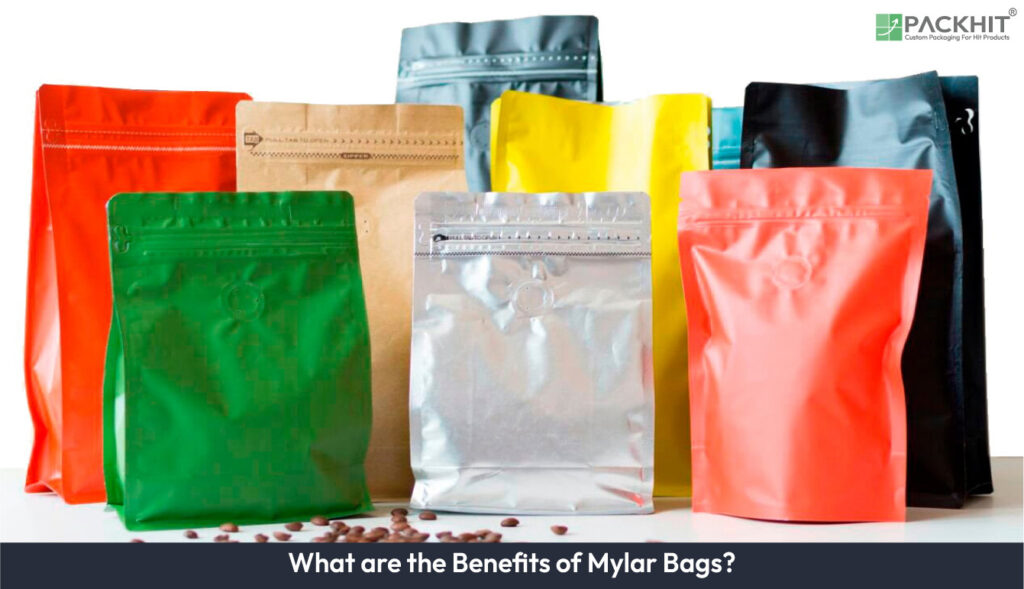Mylar bags, constructed from biaxially-oriented polyethylene terephthalate (BoPET), are highly valued for their exceptional barrier properties, offering protection against moisture, oxygen, and UV light, which helps preserve the quality and longevity of stored products. Their low oxygen and moisture vapor transmission rates make them ideal for long-term storage of perishable goods, such as food, pharmaceuticals, and seeds, ensuring product freshness and stability. Mylar bags offer high tensile strength and puncture resistance, making them suitable for heavy-duty applications, including the transportation of industrial materials. Mylar bags maintain their structural integrity under extreme temperatures, ranging from -100°F to 300°F, and resist damage from oils, acids, and solvents, which further broadens their usability across industries like food, electronics, and agriculture. Their lightweight design reduces transportation costs, and their durability minimizes the need for frequent replacements, making them cost-effective. Customization options, such as varying thicknesses, resealable closures, and printed branding, allow manufacturers to tailor the packaging to specific requirements. Features like child-resistant mechanisms add an extra layer of safety for regulated substances. These versatile, durable, and efficient packaging solutions are widely used in industries requiring secure, long-term storage and preservation of products.
The benefits of Mylar bags are detailed below:
Environmental Protection
Mylar bags are engineered to provide superior protection against environmental factors such as moisture, oxygen, and UV light. The BoPET material used in their construction features a metallized layer that acts as a barrier, reducing permeability to water vapor and gases. This barrier prevents oxidation and spoilage, making Mylar bags ideal for packaging perishable goods, such as food and pharmaceuticals. Additionally, their reflective surface mitigates the impact of UV radiation, which can degrade sensitive products like electronics or photographic materials. The combination of these properties ensures long-term preservation and stability under varying environmental conditions.
Long-Term Storage
The effectiveness of Mylar bags in long-term storage stems from their low oxygen transmission rate (OTR) and moisture vapor transmission rate (MVTR). These metrics quantify the material’s ability to block oxygen and water vapor, which are primary contributors to product degradation. For instance, Mylar bags with a thickness of 5 mil or greater can achieve near-zero OTR, making them suitable for storing grains, seeds, and dehydrated foods for years. Furthermore, their resistance to punctures and tears ensures that the integrity of the packaging remains intact, even under mechanical stress or fluctuating temperatures.
Shelf-Life Extension
Mylar bags significantly extend product shelf life by creating an airtight environment that inhibits microbial growth and chemical reactions. When combined with vacuum sealing or oxygen absorbers, these bags eliminate residual air, further reducing the risk of spoilage. For example, coffee beans stored in Mylar bags retain their aroma and flavor for up to two years, compared to a few months in conventional packaging. Similarly, pharmaceutical products benefit from the bags’ ability to maintain stable humidity levels, ensuring efficacy over their intended shelf life.
High Tensile Strength
The structural advantages of Mylar bags include their high tensile strength, flexibility, and puncture resistance. The biaxial orientation of the BoPET film enhances its mechanical properties, allowing the bags to withstand significant stress without deforming or tearing. This makes them suitable for heavy-duty applications, such as bulk storage or transportation of industrial materials. Additionally, Mylar bags can be laminated with other materials, such as aluminum foil or polyethylene, to improve their durability and barrier performance further.
Barrier Performance
Mylar bags exhibit remarkable performance under extreme conditions, including high and low temperatures. They can withstand temperatures ranging from -100°F to 300°F without compromising their structural integrity. This thermal stability makes them ideal for applications such as freeze-dried food storage or packaging items that require sterilization. Moreover, their chemical resistance ensures compatibility with a wide range of substances, including oils, acids, and solvents, making them suitable for industrial and laboratory use.
Packaging Cost-Effectiveness
Mylar bags offer a cost-effective packaging solution due to their durability, lightweight design, and ability to reduce waste. Their long lifespan minimizes the need for frequent replacements, while their lightweight nature lowers transportation costs. Additionally, the ability to customize Mylar bags in terms of size, thickness, and printing allows manufacturers to optimize packaging for specific products, reducing material usage and associated costs. For example, food manufacturers can use pre-printed Mylar bags with resealable closures to enhance consumer convenience while maintaining product freshness.
Design Customizability
Mylar bags can be customized to meet diverse packaging requirements, including size, thickness, and design. Manufacturers can choose from various thicknesses, ranging from 2 mil to 7 mil, depending on the desired level of protection. Printing options, such as branding or product information, can be added using techniques like flexographic or digital printing. Additionally, features like resealable zippers, gussets, and tear notches can be incorporated to improve functionality and user experience. These customization options make Mylar bags versatile for applications ranging from retail packaging to industrial storage.
Tear and Puncture Resistance
Mylar bags are engineered with a high level of tear and puncture resistance, making them robust enough to withstand mechanical stress during handling, storage, and transportation. The biaxial orientation of the BoPET material used in their construction strengthens the film, distributing force evenly and preventing localized damage. This is particularly beneficial for packaging sharp or irregularly shaped items, such as tools, seeds, or dehydrated food with jagged edges, where conventional plastic bags might fail. Additionally, the material’s durability ensures that the contents remain securely enclosed, preserving product quality and reducing the risk of contamination or spillage.
Child Resistant
Mylar bags can be designed to include child-resistant features, enhancing safety for households with young children. These features, such as child-resistant zippers or specialized locking mechanisms, prevent easy access to potentially harmful contents, including pharmaceuticals or cleaning agents. By complying with child safety standards like those outlined by the Consumer Product Safety Commission (CPSC), Mylar bags offer manufacturers an added layer of protection for their products while ensuring consumer safety. These customizations make them particularly valuable for industries handling sensitive or regulated substances.

